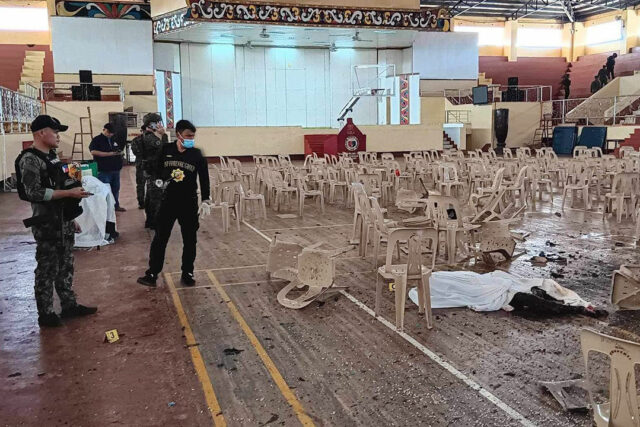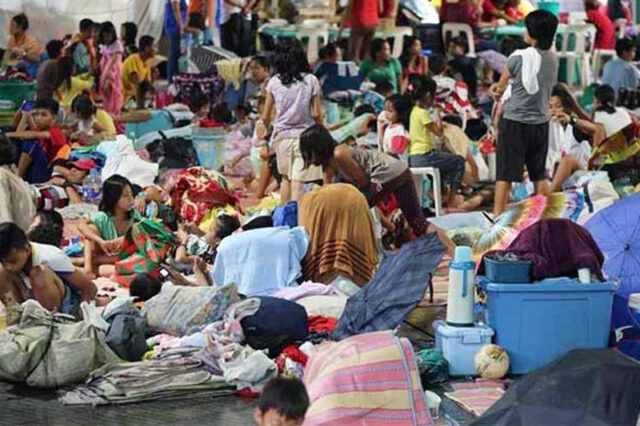Peso strengthens to four-month high
THE PESO appreciated to a four-month high against the dollar on Monday following remarks from US Federal Reserve Chair Jerome H. Powell and ahead of the release of November Philippine inflation data.
The local unit closed at P55.34 per dollar on Monday, strengthening by six centavos from its P55.40 finish on Friday, Bankers Association of the Philippines data showed.
This was the peso’s strongest close in more than four months or since its P55.19-per-dollar finish on Aug. 2.
The peso opened Monday’s session stronger at P55.34 against the dollar, which was also its closing level. Its intraday best was at P55.22, while it went down to as low as P55.37 versus the greenback.
Dollars exchanged inched down to $1.11 billion on Monday from $1.18 billion on Friday.
“The peso appreciated after Fed Chairman Powell echoed his prior cautious guidance on future policy adjustments,” a trader said in an e-mail.
The risks of the Federal Reserve slowing the economy more than necessary have become “more balanced” with those of not moving interest rates high enough to control inflation, Mr. Powell said on Friday, reaffirming the US central bank’s intent to be cautious but also offering fresh optimism on its progress so far, Reuters reported.
The Fed will next meet on Dec. 12-13 to review policy.
The peso was also supported by expectations of slower Philippine headline inflation in November, Rizal Commercial Banking Corp. Chief Economist Michael L. Ricafort said in a Viber message.
A BusinessWorld poll of 15 analysts conducted last week yielded a median estimate of 4.4% for November inflation, at the midpoint of the Bangko Sentral ng Pilipinas’ 4% to 4.8% forecast for the month.
The Philippine Statistics Authority will release the November inflation report on Tuesday.
For Tuesday, the trader said the peso could strengthen further against the dollar on the back of better inflation data.
The trader expects the peso to move between P55.20 and P55.50 a dollar on Tuesday, while Mr. Ricafort sees it ranging from P55.25 to P55.45. — A.M.C. Sy with Reuters
PSEi up after strong manufacturing data, Wall St.
PHILIPPINE SHARES climbed on Monday amid strong manufacturing activity data, Wall Street’s rise, and expectations of slower inflation last month.
The Philippine Stock Exchange index (PSEi) went up by 39.19 points or 0.62% to close at 6,284.37 on Monday, while the broader all shares index rose by 15.22 points or 0.45% to end at 3,347.44.
“The local bourse gained… thanks to the strong S&P Global Philippines Manufacturing PMI (purchasing managers’ index) [data],” Philstocks Financial, Inc. Research Analyst Claire T. Alviar said in a Viber message.
The S&P Global Philippines Manufacturing Purchasing Managers’ Index rose to 52.7 in November from 52.4 in October amid robust demand and growth in new orders and production, a report released on Friday showed.
A PMI reading above the 50 mark denotes better operating conditions, while a reading below 50 signals deterioration.
“Moreover, hopes that the Philippine inflation last month would slow down helped lift the sentiment. However, many were still seen on the sidelines as they wait for the release of the inflation rate,” she added.
Value turnover fell to P3.77 billion on Monday with 446.56 million shares changing hands from the P4.41 billion with 1.68 billion issues traded on Friday.
Meanwhile, a BusinessWorld poll of 15 analysts yielded a median estimate of 4.4% for November headline inflation, at the midpoint of the 4-4.8% forecast of the Bangko Sentral ng Pilipinas (BSP) for the month.
If realized, the November consumer price index (CPI) would be slower than the 4.9% print in October and the 8% logged in the same month last year. However, November would mark the 20th straight month that inflation exceeded BSP’s 2-4% annual target.
November CPI data will be released on Tuesday.
Shares increased due to the “positive sentiment spillover” from US markets’ rally on Friday, China Bank Securities Corp. Research Associate Lance U. Soledad said in an e-mail.
“Moreover, we think that prospects of a continued easing in local inflation further boosted risk-on appetite,” he added.
On Friday, the Dow Jones Industrial Average rose 294.61 points or 0.82% to 36,245.50; the S&P 500 gained 26.83 points or 0.59% to 4,594.63; and the Nasdaq Composite added 78.81 points or 0.55% to 14,305.03, Reuters reported.
At home, all sectoral indices rose on Monday. Mining and oil increased by 219.87 points or 2.28% to 9,853.38; industrials went up by 84.89 points or 0.97% to 8,831.16; financials jumped by 16.37 points or 0.94% to 1,751.78; holding firms advanced by 30.85 points or 0.52% to 5,949.05; services climbed by 3.65 points or 0.24% to 1,523.86; and property rose by 5.67 points or 0.2% to 2,751.52.
Decliners outnumbered advancers, 91 versus 83, while 46 names closed unchanged.
Net foreign buying declined to P287.54 million on Monday from P1.38 billion on Friday. — S.J. Talavera with Reuters
Philippine manhunt afoot for bombing suspects
By Kyle Aristophere T. Atienza, Reporter
A MANHUNT is under way for the attackers who bombed a Catholic Mass that killed four people in southern Philippines, a senior military officer said on Monday, vowing to do everything possible to bring the perpetrators to justice.
Police are looking into at least two suspects they think were behind the blast, which Islamic State (IS) militants claimed.
“As we speak, there’s an ongoing massive operation to hunt these terrorist groups or suspected perpetrators of the bombing,” William Gonzales, Western Mindanao Command chief, told reporters after a security meeting in Marawi City.
The bomb went off on Sunday during a service at a university gymnasium in Marawi, a city left in ruins in 2017 by a five-month military campaign to end an occupation by Islamic State loyalists that had triggered alarm across Asia.
“(We have persons) of interest, but the investigation is still ongoing,” regional police chief Allan Nobleza told GMA News, adding that one of the suspects was linked to a local militant group. “In order not to preempt the investigation, we will not divulge the names.”
The United States condemned the “horrific terrorist attack” and said it stood with Filipinos in rejecting violence, joining a chorus of support from countries including Japan, Australia, Britain, China and Canada. “We mourn those killed in the attack, and our thoughts are with the injured,” State Department spokesman Matthew Miller said in statement.
Islamic State militants claimed responsibility for the bombing at Mindanao State University, shortly after Philippine President Ferdinand R. Marcos, Jr. said “foreign terrorists” were responsible.
Marawi is in an area known as Bangsamoro, an underdeveloped Muslim region in the predominantly Catholic Philippines, that has for decades battled with lawlessness, separatist violence and clan conflicts, prompting concern that it could become fertile ground for extremism.
Military chief Romeo S. Brawner, Jr., who attended a security briefing with troops and police in Marawi, said he suspected the bombing could be a retaliatory attack for operations against local extremist groups in the southern region of Mindanao.
“That could be one of the strong possibilities why this occurred,” Mr. Brawner said. “Your security forces… are working doubly hard to make sure that the perpetrators of this terrorist attack will be brought to justice.”
The military recently said it had killed a senior operative from Abu Sayyaf, a group notorious for kidnapping and piracy that has aligned itself with the Islamic State.
‘INTERNATIONAL IMPLICATIONS’
Abu Sayyaf’s late leader, Isnilon Hapilon, was Islamic State’s anointed “emir” in Southeast Asia and mastermind of the 2017 occupation of Marawi, which led to the deaths of more than 1,000 people during a five-month war, among them fighters from multiple countries. Mr. Hapilon was killed by a sniper.
The military said it had also conducted two operations in Mindanao on Friday and Sunday against Dawlah Islamiya-Maute, a group that joined Hapilon in taking over Marawi in 2017, seeking to turn it into a Southeast Asian wilayat — or governorate — for Islamic State.
Spokesman Xerxes Trinidad said the military was trying to validate Islamic State’s claim of responsibility.
Of the 54 who were wounded in the bombing, Mr. Trinidad said only seven remained in hospital.
Classes resumed in Marawi on Monday, but with tighter security.
The bombing incident prompted authorities to put Metro Manila under a heightened alert.
Terror groups are hard to disperse since they work underground, Joshua Bernard B. Espeña, who teaches international relations at the Polytechnic University of the Philippines, said in a Facebook Messenger chat.
“In the case of IS, it was never eradicated to begin with,” he said. “The group can be safely termed a blob network, with various groups pledging allegiance to IS’ anthem; one group would just be subsumed into another based on religious, financial and political grounds.”
Antonio A. Contreras, who used to teach political science at De La Salle University in Manila, said the Sunday attack should not stop the government from focusing on external security since Islamic State threats have “international implications.”
“The IS, whatever you call them, is an external group,” he said by telephone. “It’s a false dichotomy to say that it’s going to now undermine or diminish the focus of the President on external threats. Terrorism that is financed by external forces is still an external threat.”
With IS claiming responsibility for the bombing, it’s easier to justify an external security-oriented action, said Hansley A. Juliano, who teaches political science at the Ateneo de Manila University, said in a Messenger chat.
“Local terrorist agents can do this only with supplies and training and intelligence from abroad,” he said. “Blocking those and finding out through international allies who are enabling them should help.”
Marawi City is the capital of Lanao del Sur, one of the five provinces in the Bangsamoro Autonomous Region in Muslim Mindanao, which was formed in 2019 as part of a peace deal to end a decades-long conflict between the government and Moro secessionists.
“The incident could again highlight the fragmentation of political groups in the island region, which would entail more attention and resources in addressing the causes of socioeconomic and ethnic divisions in the area,” Philip Arnold P. Tuaño, dean of the Ateneo School of School of Government, said via Messenger chat. — with Reuters
Earthquake aftershocks in Mindanao force thousands to live in evacuation centers
STRONG aftershocks from an earthquake that killed at least three people and a new tremor in southern Philippines are forcing thousands of residents to stay in evacuation centers, disaster officials said on Monday.
“We are scared up to now because of the aftershocks,” Alex Arana, disaster agency chief of Surigao del Sur, told DZBB radio.
His coastal province was closest to the epicenter of the magnitude 7.6 earthquake, which struck late on Saturday and was followed by aftershocks. It was also the most damaged area. Two people died — one as a result of falling debris and another because of a collapsed wall — and eight were injured in Surigao del Sur, Mr. Arana said.
A pregnant woman was killed when a wall collapsed as she and her family were fleeing their home in Tagum City in Davao del Norte province.
As of late Sunday, more than 108,000 people were staying in 115 evacuation centers in Surigao del Sur, government data showed.
A magnitude 6.8 earthquake, with a depth of 1 km (0.62 mile), struck Mindanao in the Philippines in the early hours of Monday, the Philippine seismology agency reported.
It was not part of the magnitude 7.6 quake and about 1,700 aftershocks, officials said.
“We get dizzy from tremors every so often. We choose to stay here at the evacuation center for now,” Susan Clor, a resident of Hinatuan town in Surigao del Sur, told GMA News.
Earthquakes are common in the Philippines, which lies on the “Ring of Fire,” a belt of volcanoes circling the Pacific Ocean that is prone to seismic activity. — Reuters
Court orders VP to comment on lawsuit vs confidential funds
THE PHILIPPINE SUPREME Court (SC) has ordered the Office of the Vice President (OVP) to comment on a lawsuit seeking to void the transfer of P125 million in confidential funds to the agency last year for being illegal.
Vice-President Sara Duterte-Carpio was given 10 days to file her pleading, Clerk of Court Marife Lomibao-Cuevas said in a two-page notice released on Monday, citing a Nov. 14 order by the tribunal.
Executive Secretary Lucas P. Bersamin and Budget Secretary Amenah F. Pangandaman were also ordered to comment on the petition filed last month by a group of lawyers.
In the same resolution, the High Court ordered the plaintiffs to comply with court guidelines including the submission of an electronic copy of the petition and a verified declaration of a true copy.
In a 49-page petition filed on Nov. 7, the plaintiffs including former Election chief Christian S. Monsod and former Finance Undersecretary Maria Cielo D. Magno asked the tribunal to order the return of the funds to the National Treasury.
The plaintiffs argued that the Office of the President, from which the budget came, does not have the power to transfer its contingency fund to the Vice President because only Congress can do so.
“Clearly, the transfer from the contingency fund of the Office of the President to an inexistent ‘confidential fund’ is invalid, much not having a valid purpose for the said unlawful transfer,” according to a copy of the petition.
The plaintiffs said the OVP spent the P125 million in 11 days, “much to the prejudice and burden of the Filipino people.”
Ms. Duterte-Carpio earlier said the lawsuit would once and for all settle the validity of the fund transfer to her office.
The Budget department released P221.42 million to the office in December, P155 million of which was disbursed and P66.42 million remained as unobligated allotments, the plaintiffs said.
The petitioners said the 2022 General Appropriations Act neither gave the Vice President an item nor an allotment for confidential funds.
They noted that confidential and intelligence expenses require not only strong internal controls in their release and use, but also strict accounting and auditing rules to prevent misuse.
In contrast, the Vice President’s request for confidential funds was for various projects and activities under the office’s good governance program, aside from official engagements and functional representation in international and domestic events.
“The fund transferred from the contingency fund of the Office of the President were made to the inexistent confidential fund of respondent Office of the Vice President despite there being existing specific budget items to cover the very stated purposes,” according to the petition.
Ms. Duterte-Carpio had sought P500 million in confidential funds for her office and another P150 million for the Education department, which she also heads, for next year.
Lawmakers have since stripped several agencies including her office of the confidential budgets, transferring P1.23 billion worth of these funds to security agencies amid worsening tensions with China. — Jomel R. Paguian
Congressman seeks review of death penalty for drug crimes
By John Victor D. Ordoñez, Reporter
A PHILIPPINE congressman said on Monday that lawmakers should consider reimposing the death penalty for individuals convicted of serious drug-related crimes, citing how China recently executed two Filipinos for drug smuggling.
“China was firm in executing Filipinos, yet we are being flooded with tons and tons of illegal drugs, especially shabu (crystal methamphetamine) from China,” Surigao del Norte Rep. Robert Ace S. Barbers, who heads the House Committee on Dangerous Drugs.
Earlier, Mr. Barbers filed House Bill No. 1543 seeking to impose the death penalty on heinous crimes, especially drug-related offenses. It is now pending before the House Justice Committee.
He said the death penalty may deter the continuous inflow of illegal drugs from China.
The Department of Foreign Affairs (DFA) on Saturday announced that the two Filipinos were executed on Nov. 24 for drug trafficking offenses in China, citing confirmation by the Philippine Consulate General in Guangzhou.
They had been arrested in 2013 and had tried to appeal their drug trafficking convictions several times in 2016.
“The Government of the Republic of the Philippines further exhausted all measures available to appeal to the relevant authorities of the People’s Republic of China to commute their sentences to life imprisonment on humanitarian grounds,” the DFA said.
The DFA noted that there are 92 death penalty cases in China involving Filipinos, with only one being drug-related.
“It is a wonder that while China was very hard on drug trafficking, the drugs that come to our shores originate from its ports,” Mr. Barbers said. “Yet, we have yet to see one Chinese convict being executed to deter others from committing such heinous a crime.”
Sara opposes Marcos amnesty program, peace talks with Reds

By Kyle Aristophere T. Atienza, Reporter
VICE PRESIDENT Sara Duterte-Carpio on Monday expressed opposition to the Marcos administration’s amnesty program for several local rebel groups as well as restarting peace talks with the Maoist movement.
The joint statement between the Philippine government and the National Democratic Front (NDF) expressing their commitment to pursuing peace talks was an “agreement with the devil,” Ms. Duterte-Carpio said in a video statement on the 5th anniversary of the government’s anti-communist task force, in which she serves as co-vice chair.
In their joint statement in Oslo, Norway last month, the two parties cited “serious socioeconomic and environment issues” as well as “foreign security threats” for agreeing to “a principled and peaceful resolution” of their armed conflict.
“We appeal to your power to review these proclamations and agreements,” Ms. Duterte-Carpio told Mr. Marcos in her speech at the National Task Force to End Local Communist Armed Conflict (NTF-ELCAC) anniversary.
The NDF is a coalition of Maoist revolutionary groups that represents the Communist Party of the Philippines (CPP) and the New People’s Army (NPA), in the negotiations with the government.
“Mr. President, we can negotiate for peace and reconciliation and pursue meaningful development efforts in the Philippines without capitulating to the enemies,” the vice president continued.
She criticized two presidential proclamations that offered amnesty to members of the CPP-NPA-NDF as well as the Rebolusyonaryong Partido ng Manggagawa – Pilipinas/Revolutionary Proletarian Army/Alex Boncayao Brigade.
The Maoist movement has been pushing for national industrialization and other socioeconomic reforms in its peace talks with the Philippine government.
“Ang dapat nating gawin ay ipagpatuloy ang ating mga nasimulan sa (the thing we should do is to continue what we have started in) NTF-ELCAC,” she said. “At mas palakasin pa ang mga ito (and to make it stronger).”
The NTF-ELCAC was created by her father, former president Rodrigo R. Duterte, through a 2018 executive order.
The 2016 peace talks between the government and the NDF under the Duterte administration did not last long, with the state and rebels accusing each other of ceasefire violations.
DoJ to press on POGO probe
THE DEPARTMENT of Justice (DoJ) will continue its probe into Philippine Offshore Gaming Operators (POGOs) that have recently been linked to various cases of human trafficking and exploitation, an official said on Monday.
Justice Undersecretary-in-Charge of the Inter-Agency Council against Trafficking (IACAT) Nicholas Felix L. Ty told state television PTV 4 that human trafficking is a prevailing issue concerning POGOs, in addition to problems such as scamming, kidnapping, and torture.
“We cannot deny that there are indeed illegal POGOs where rumored illegal activities take place,” he said in Filipino. “The thousands of victims we rescue there are proof of that. With our ongoing operations against POGOs, we aim to save even more victims.”
In the interview, the undersecretary acknowledged studies revealing that the Philippines is one of the global hotspots for online sexual abuse and exploitation of children. He said poverty, proficiency in the English language, and access to technology, contributed to the rising cases of online exploitation.
The official said the department has requested Congress to augment the funds allocated for the fight against human trafficking, pointing out that “for the year 2023, the budget initially given to us [DoJ] was P99 million, but it was later slashed to P79 million,” as expressed in mixed English and Filipino.
Meanwhile, the justice department inaugurated its Human Rights Office, and Gender and Development Special Protection Office on Monday, aligning with the National Human Rights Consciousness Week in the country. Justice Secretary Jesus Crispin C. Remulla stated in his speech, “There are now dedicated offices meant to realize the vision of a more humane and human rights-centric justice system that shall deliver ‘real justice in real time.” — Jomel R. Paguian
PHL, WEF sign climate agreements
THE PHILIPPINES and the World Economic Forum (WEF) have signed agreements to boost the blue carbon ecosystem and address plastic pollution on the sidelines of the United Nations’ climate conference in Dubai, the Palace said.
Blue carbon initiatives focus on conserving and restoring coastal ecosystems such as mangroves and seagrass, which capture carbon dioxide emissions.
After the signing of the two agreements, both the Philippines and the WEF will start sharing best practices to the communities, civil societies and corporate sector to translate the agreements “into practical progress,” WEF Center for Nature and Climate managing director Neo Gim Huay said in a Palace press release.
Environment and Natural Resources Secretary Ma. Antonio Yulo-Loyzaga signed the agreement on behalf of the Philippine government.
The WEF official said the Philippines as an archipelagic nation is “a very important economy.”
The Philippines at the weekend lauded adoption of loss and damage funding at the COP28,
“We hope that this will assist us, and not just the Philippines but other at-risk countries,” Climate Change Commission Vice Chair and Executive Director Robert EA Borje said during his intervention at the ceremonial opening of the conference. — Kyle Aristophere T. Atienza
TWGs to vet lands for housing
BAGUIO CITY — Department of Human Settlements and Urban Development (DHSUD) Secretary Jose Rizalino Acuzar has ordered the creation of technical working groups (TWG) to implement the Marcos administration’s flagship housing program as contained in Executive Order (EO) No. 34.
The TWGs will consist of a pool of experts on environmental, land use, urban planning and development, public housing and settlements, and Pambansang Pabahay Para sa Pilipino (4PH) Program from both the Department’s central and regional offices.
Their aim is to assist in fast-tracking the identification of government-owned land across the country particularly for housing, Mr. Acuzar said.
Through Department Order No. 2023-020 dated Nov. 25, he instructed the TWGs to lead the identification and vetting of government-owned lands for housing, human settlements and urban development.
Among the tasks of the TWGs are validation of submitted land inventory, land suitability assessment and coordination with national and local government agencies.
The TWG-Central Office will be headed concurrently by the Undersecretary for Planning, Undersecretary Henry Yap, while TWGs in the Regional Offices are to be headed by chiefs of their respective Environmental, Land Use and Urban Planning and Development Divisions.
EO 34 declared 4PH as flagship program of the government and mandated DHSUD to lead activities on idle land inventory.
“We’ve been discussing with some local government units and national government agencies on how we can achieve a comprehensive list of land assets we can use. This order should stimulate more activities on the ground as we aggressively implement the 4PH,” Mr. Acuzar was quoted as saying.
The order also granted authority to TWGs in recommending the approval of policies, guidelines, plans, projects and activities that will support the land inventory, identification and determination of process.
Mr. Acuzar further tasked the TWGs to submit list of lands suitable for housing, human settlements and urban development that are subject for acquisition and development.
EO 34 empowers the DHSUD to identify national and local government lands that are “suitable for housing and human settlements, including new townships and estates development, in coordination with concerned government agencies and local government units. — Artemio A. Dumlao
BUSECO’s tax deficiency voided
THE COURT of Tax Appeals (CTA) has canceled the tax deficiencies and compromise penalties totaling P76.39 million of the Bukidnon Second Electric Cooperative, Inc. (BUSECO) for the taxable year 2012 due to the Bureau of Internal Revenue (BIR)’s failure to abide by the due process.
In a 21-page decision dated Nov. 28, the CTA Special Third Division nullified the tax assessment of BUSECO, citing the unauthorized status of BIR tax examiners to assess its compliance with tax laws and verify financial records due to the absence of a letter of authority (LoA).
The CTA emphasized that obtaining a LoA before examination and assessment is a due process requirement.
“[A]n assessment must be preceded by a valid LOA, before the BIR may conduct an investigation of a taxpayer; otherwise, the resulting tax assessment shall be void and ineffectual,” read part of the ruling penned by Associate Justice Corazon G. Ferrer-Flores.
BUSECO argued in its petition before the tax court that it is permanently exempt from income tax under Presidential Decree No. 269 which provides tax incentives to electric cooperatives.
The appellate court, in the same decision, rejected a distinct petition for review submitted by BUSECO concerning its tax deficiencies and compromise penalties amounting to P47.7 million for the taxable year 2014. The court clarified that since the BIR had not filed a final assessment, it had no jurisdiction to rule on the petition directly related to the assessment itself, but rather only on protests raised against the assessment. — Jomel R. Paguian













